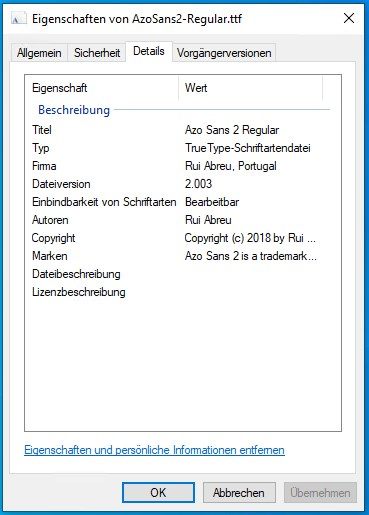Dateiversion vs. FileVersion-Property - (ECM Detection)
Hallo zusammen,
ich verteile mit einem ECM-Paket eine Schrift an unsere Workstations. Funktioniert prinzipiell: Die .ttf wird nach C:\Windows\Fonts\ kopiert und in der Registry eingetragen. Alles OK, Schrift ist im System verfügbar.
Damit das ECM-SoftwareCenter erkennt, ob der Schrift-Pakete installiert ist, habe ich als Detection die Abfrage, ob im Filesystem die betreffende Datei AzoSans2-Regular.ttf mit der Datei-Version 2.003 vorhanden ist. Das erkennt ECM aber offenbar nicht. Zu Fuß nachgeguckt und die ttf ist da und "Dateiversion" stimmt (siehe Screenshot). In den Item-Properties der Datei ist "FileVersion" allerdings leer (s.u.).
Eine Detection auf das Datum der Datei funktioniert und reicht mir erstmal als Workaround.
Wisst ihr,
(1) auf welche Versionsinformation der Datei ECM prüft und
(2) warum die "Dateiversion" im Explorer nicht gleich der "FileVersion" in PS ist und
(3) wo ich in Item-Properties die "Dateiversion" aus dem Explorer wiederfinden würde ?
Vielen Dank und später schönes WoE
/pp

ich verteile mit einem ECM-Paket eine Schrift an unsere Workstations. Funktioniert prinzipiell: Die .ttf wird nach C:\Windows\Fonts\ kopiert und in der Registry eingetragen. Alles OK, Schrift ist im System verfügbar.
Damit das ECM-SoftwareCenter erkennt, ob der Schrift-Pakete installiert ist, habe ich als Detection die Abfrage, ob im Filesystem die betreffende Datei AzoSans2-Regular.ttf mit der Datei-Version 2.003 vorhanden ist. Das erkennt ECM aber offenbar nicht. Zu Fuß nachgeguckt und die ttf ist da und "Dateiversion" stimmt (siehe Screenshot). In den Item-Properties der Datei ist "FileVersion" allerdings leer (s.u.).
Eine Detection auf das Datum der Datei funktioniert und reicht mir erstmal als Workaround.
Wisst ihr,
(1) auf welche Versionsinformation der Datei ECM prüft und
(2) warum die "Dateiversion" im Explorer nicht gleich der "FileVersion" in PS ist und
(3) wo ich in Item-Properties die "Dateiversion" aus dem Explorer wiederfinden würde ?
Vielen Dank und später schönes WoE
/pp
PS C:\Windows\Fonts> (get-item .\AzoSans2-Regular.ttf) | fl -Property *
PSPath : Microsoft.PowerShell.Core\FileSystem::C:\Windows\Fonts\AzoSans2-Regular.ttf
PSParentPath : Microsoft.PowerShell.Core\FileSystem::C:\Windows\Fonts
PSChildName : AzoSans2-Regular.ttf
PSDrive : C
PSProvider : Microsoft.PowerShell.Core\FileSystem
PSIsContainer : False
Mode : -a----
VersionInfo : File: C:\Windows\Fonts\AzoSans2-Regular.ttf
InternalName:
OriginalFilename:
FileVersion:
FileDescription:
Product:
ProductVersion:
Debug: False
Patched: False
PreRelease: False
PrivateBuild: False
SpecialBuild: False
Language:
BaseName : AzoSans2-Regular
Target : {}
LinkType :
Name : AzoSans2-Regular.ttf
Length : 115660
DirectoryName : C:\Windows\Fonts
Directory : C:\Windows\Fonts
IsReadOnly : False
Exists : True
FullName : C:\Windows\Fonts\AzoSans2-Regular.ttf
Extension : .ttf
CreationTime : 20.05.2022 09:08:04
CreationTimeUtc : 20.05.2022 07:08:04
LastAccessTime : 20.05.2022 09:08:05
LastAccessTimeUtc : 20.05.2022 07:08:05
LastWriteTime : 22.04.2021 14:24:26
LastWriteTimeUtc : 22.04.2021 12:24:26
Attributes : Archive
Bitte markiere auch die Kommentare, die zur Lösung des Beitrags beigetragen haben
Content-ID: 2841085141
Url: https://administrator.de/forum/dateiversion-vs-fileversion-property-ecm-detection-2841085141.html
Ausgedruckt am: 14.07.2025 um 23:07 Uhr
4 Kommentare
Neuester Kommentar
Servus.
docs.microsoft.com/en-us/windows/win32/properties/props
docs.microsoft.com/en-us/windows/win32/menurc/versioninfo-resour ...
Grüße Uwe
Wisst ihr,
(1) auf welche Versionsinformation der Datei ECM prüft und
k.A. benutze ich nicht.(1) auf welche Versionsinformation der Datei ECM prüft und
(2) warum die "Dateiversion" im Explorer nicht gleich der "FileVersion" in PS ist und
Weil bei Schriftarten, der Explorer ein anderes Propertyset anzeigt das speziell für Schriftarten gedacht ist und die Metadaten direkt aus der TTF-Struktur verwendet statt den Filestream.docs.microsoft.com/en-us/windows/win32/properties/props
docs.microsoft.com/en-us/windows/win32/menurc/versioninfo-resour ...
(3) wo ich in Item-Properties die "Dateiversion" aus dem Explorer wiederfinden würde ?
s.o. , oder so direkt in ein Version Object verwandeltAdd-Type -AssemblyName PresentationCore
[version][System.Windows.Media.GlyphTypeface]::new([uri]::new("C:\Windows\Fonts\arial.ttf")).Version.toString().replace(',','.')